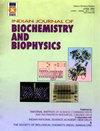胰岛素、表黄素和丹参提取物对链脲佐菌素诱导的糖尿病雄性大鼠抗糖尿病作用的比较研究
IF 1.5
4区 生物学
Q4 BIOCHEMISTRY & MOLECULAR BIOLOGY
引用次数: 0
摘要
使用降糖药治疗糖尿病有一些局限性,如不良反应和高继发失败率。这些不良反应迫使糖尿病患者使用具有相似效力且无副作用的草药。因此,人们对从天然产品,特别是从植物材料中提取的降糖剂越来越感兴趣。换句话说,从草药或天然产品中寻找更好的药物来治疗糖尿病是必要的。比较丹参提取物与胰岛素、表黄素对糖尿病雄性大鼠的抗糖尿病作用。植物材料最初被提取出来并口服给动物。大鼠分别给予胰岛素、表黄素或水提物治疗后,观察口服葡萄糖耐量试验(OGTT)、空腹血糖及体重变化。为了分析胰岛素、表黄素和S. mirzayanii的分子功能,我们还研究了葡萄糖转运体-4 (GLUT4)、磷酸烯醇丙酮酸羧激酶(PEPCK)和葡萄糖6-磷酸酶(G6Pase)基因在健康和链脲佐菌素(STZ)糖尿病雄性大鼠中的表达。所有组均进行逆转录定量聚合酶链反应(RT-qPCR),数据按公式2-ΔΔCt归一化处理。统计学分析采用单因素方差分析。在空腹血糖和OGTT方面,正常对照组与胰岛素、表黄素、mirzayanii治疗组比较,差异无统计学意义。但与未控制的糖尿病组有显著差异(P <0.05)。与此同时,与其他组相比,不受控制的糖尿病组体重增加较少。β -actin、GLUT4、G6Pase和PEPCK基因的RT-qPCR产物长度分别为228、140、79和151 bp。在基因表达研究中,对照组与胰岛素、表黄素和S. mirzayanii处理组GLUT4、G6Pase和PEPCK mRNA水平差异有统计学意义。对GLUT4 mRNA表达增加作用最大的分别是胰岛素、表黄素和S. mirzayanii。对PEPCK mRNA表达降低作用最大的分别是胰岛素、表黄素和S. mirzayanii。降低G6Pase mRNA表达的效果最大的也与胰岛素有关,但表黄素和紫参的作用几乎相同。综上所述,本研究结果表明,mirzayanii可以作为具有胰岛素和表观黄素模拟活性的草药。本文章由计算机程序翻译,如有差异,请以英文原文为准。
Comparative study of anti-diabetic effects of insulin, epigenin and Salvia mirzayanii extract in streptozotocin-induced diabetic male rats
The use of hypoglycemic medications for diabetes has several limitations, such as adverse reactions and high rates of secondary failure. These adverse effects have forced patients with diabetes to use herbal medicines that have a similar degree of potency without side effects. So, there has been a growing interest in hypoglycemic agents from natural products, in particular, those derived from plant materials. In other words, searching for better agents from herbs or natural products to treat diabetes is duly needed. The purpose of this study was to compare the anti-diabetic effects of Salvia mirzayanii extract with insulin and epigenin in diabetic male rats. The plant material was initially extracted and administered orally to the animals. After treatment of rats with insulin, epigenin or aqueous extract of S. mirzayanii, oral glucose tolerance test (OGTT), fasting blood glucose and animal weight changes were examined. To analyze the molecular function of insulin, epigeninand S. mirzayanii, expression of glucose transporter-4 (GLUT4), phosphoenol pyruvate carboxykinase (PEPCK) and glucose 6-phosphatase (G6Pase) genes in healthy and streptozotocin (STZ)-diabetic male rats were studied as well. Reverse transcription quantitative polymerase chain reaction (RT-qPCR) was performed for all groups and the data were normalized using the formula 2-ΔΔCt.Statistical analysis was performed by one-way analysis of variance. In fasting blood glucose and OGTT, there was no significant difference between the normal control group and the diabetic groups treated with insulin, epigenin and S. mirzayanii. But there was a significant difference with the uncontrolled diabetic group (P < 0.05). Meanwhile, the uncontrolled diabetic group gained less weight compared to the other groups. RT-qPCR of beta-actin, GLUT4, G6Pase and PEPCK genes yielded products with lengths of 228, 140, 79 and 151 bp, respectively. In gene expression studies, there was a significant difference between the mRNA levels of GLUT4, G6Pase and PEPCK in control groups and the groups treated with insulin, epigenin and S. mirzayanii. The greatest effect on increasing the mRNA expression of GLUT4 was related to insulin, epigenin and S. mirzayanii, respectively. The greatest effect in reducing the mRNA expression of PEPCK was related to insulin, epigenin and S. mirzayanii, respectively. The greatest effect in reducing the mRNA expression of G6Pase was also related to insulin, but the effect of epigenin and S. mirzayaniiwas almost the same. Overall, obtained results show that S. mirzayanii can be utilized as a herbal medication with insulin and epigenin mimetic-activity.
求助全文
通过发布文献求助,成功后即可免费获取论文全文。
去求助
来源期刊

Indian journal of biochemistry & biophysics
生物-生化与分子生物学
CiteScore
2.90
自引率
50.00%
发文量
88
审稿时长
3 months
期刊介绍:
Started in 1964, this journal publishes original research articles in the following areas: structure-function relationships of biomolecules; biomolecular recognition, protein-protein and protein-DNA interactions; gene-cloning, genetic engineering, genome analysis, gene targeting, gene expression, vectors, gene therapy; drug targeting, drug design; molecular basis of genetic diseases; conformational studies, computer simulation, novel DNA structures and their biological implications, protein folding; enzymes structure, catalytic mechanisms, regulation; membrane biochemistry, transport, ion channels, signal transduction, cell-cell communication, glycobiology; receptors, antigen-antibody binding, neurochemistry, ageing, apoptosis, cell cycle control; hormones, growth factors; oncogenes, host-virus interactions, viral assembly and structure; intermediary metabolism, molecular basis of disease processes, vitamins, coenzymes, carrier proteins, toxicology; plant and microbial biochemistry; surface forces, micelles and microemulsions, colloids, electrical phenomena, etc. in biological systems. Solicited peer reviewed articles on contemporary Themes and Methods in Biochemistry and Biophysics form an important feature of IJBB.
Review articles on a current topic in the above fields are also considered. They must dwell more on research work done during the last couple of years in the field and authors should integrate their own work with that of others with acumen and authenticity, mere compilation of references by a third party is discouraged. While IJBB strongly promotes innovative novel research works for publication as full length papers, it also considers research data emanating from limited objectives, and extension of ongoing experimental works as ‘Notes’. IJBB follows “Double Blind Review process” where author names, affiliations and other correspondence details are removed to ensure fare evaluation. At the same time, reviewer names are not disclosed to authors.
 求助内容:
求助内容: 应助结果提醒方式:
应助结果提醒方式:


